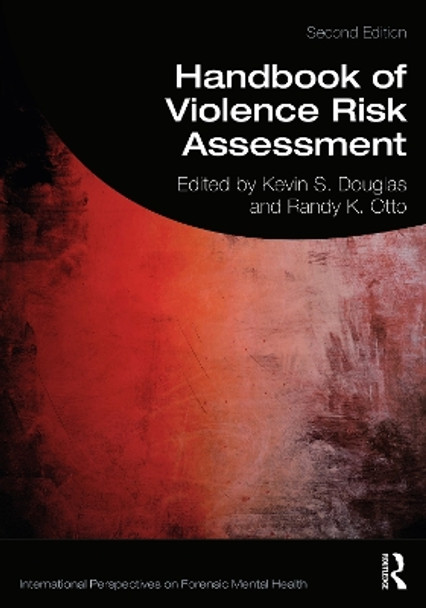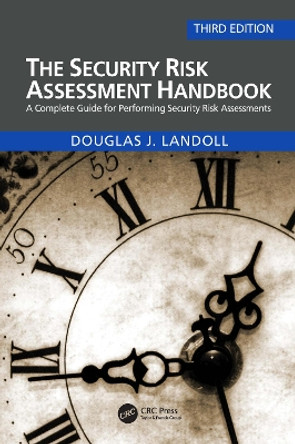Description
The Handbook of Violence Risk Assessment, Second Edition, builds on the first edition's comprehensive discussion of violence risk assessment instruments with an update of research on established tools and the addition of new chapters devoted to recently developed risk assessment tools.
Featuring chapters written by the instrument developers themselves, this handbook reviews the most frequently used violence risk assessment instruments-both actuarial and structured professional judgment-that professionals use to inform and structure their judgments about violence risk. Also included are broader chapters that address matters such as the consideration of psychopathy and how the law shapes violence risk assessment.
Already the primary reference for practitioners, researchers, and legal professionals in this area, this second edition's easy-to-access, comprehensive, and current information will make it an indispensable reference for those in the field.
About the Author
Kevin S. Douglas, LLB, PhD, is Professor of Clinical-Forensic Psychology at Simon Fraser University; Researcher at Helse Bergen HF Competence Centre in Forensic Psychiatry; and Senior Research Advisor at the Oslo University Hospital Competence Centre in Forensic Psychiatry.
Randy K. Otto, PhD, ABPP, has been a faculty member at the University of South Florida since 1989. His primary appointment is in the Department of Mental Health Law and Policy, and he has adjunct appointments in the Departments of Psychology and Criminology.
Reviews
My endorsement of the Handbook's 2010 edition predicted it would become violence risk assessment's "best sourcebook for the next decade." It did, and this new edition will do the same. Thoroughly updated, revised and expanded, this comprehensive and dependable resource should be within reach whether you are a forensic clinician, researcher or trainee.
-Thomas Grisso, PhD, emeritus professor, University of Massachusetts Medical School.
Staying abreast of newly published and updated violence risk assessment tools is a challenge. This compendium provides a current, authoritative, concise review of major tools-and will be an indispensable resource for forensic and correctional practitioners.
-Jennifer Skeem, Florence Krenz Mack Professor of Social Welfare, professor, Goldman School of Public Policy, University of California, Berkeley
The science and practice of managing violence risk are both changing fast. The editors have engaged first-rate scientists and practitioners to provide a state-of-the art overview of this vital-but challenging-field. The result is authoritative, scholarly yet inherently practical. The new edition of this classic handbook is essential reading for those tasked with managing those at risk of violence. The guidance provided is not only clinically astute but also rock-solid scientifically.
-David J. Cooke, PhD, faculty of Psychology, University of Bergen, Bergen, Norway
The latest edition is an invaluable resource for clinicians, lawyers, and judges - and a must-read for students. Retaining the strengths of the first edition, original chapters have been updated to reflect the rapid developments in the field as well as the substantial revisions and further evaluations of the measures. Chapters reviewing additional measures have been added, and a new chapter summarizes screening and emerging measures. The chapter that describes key legal issues and developments is a necessary and welcome addition.
-James R. P. Ogloff, University Distinguished Professor & Director, Centre for Forensic Behavioural Science, Swinburne University and Forensicare, Melbourne, Australia.
This book is a compendium of information and evidence relating to the most important risk assessment guidance available today. As such, it is an essential resource for practitioners working in a wide range of forensic mental health, criminal justice, and civil settings, and with children and young people as well as with adults. Whether you are an established practitioner or early in your career, this volume should be required reading to inform professional decision-making as regards violence risk assessment and management.
-Caroline Logan, MA, MAppSci, DPhil, Greater Manchester Mental Health NHS Foundation Trust and University of Manchester, Manchester, UK
The editors have widened and deepened the scope of Handbook of Violence Risk Assessment. New chapters authoritatively address the continuous arrival of new instruments and approaches and the challenges of presenting the results of violence risk assessments in court. The first edition has been the go-to volume for facts and theory in this field for 10 years. The second edition looks set to achieve the same status.
-Alec Buchanan, PhD, MD, Division of Law & Psychiatry, Yale School of Medicine
I wish the editors, the contributors, and the publisher all due success for the new edition. It is not a book that needs to be shelved; it needs to be read. My hope, too, is that that some evaluees, and perhaps their counsel, will benefit from gaining a close understanding of how the many formats are designed to work and how the ensuing results should be interpreted. The work we do has far-reaching implications for making decisions on behalf of civilly-detained patients, forensic psychiatric patients, and persons held in prisons while suffering from mental and personality disorders. The book is a "call to arms."
-From the "Foreword" by Christopher D. Webster, PhD, professor emeritus of psychology at Simon Fraser University
My endorsement of the Handbook's 2010 edition predicted it would become violence risk assessment's "best sourcebook for the next decade." It did, and this new edition will do the same. Thoroughly updated, revised and expanded, this comprehensive and dependable resource should be within reach whether you are a forensic clinician, researcher or trainee.
-Thomas Grisso, PhD, emeritus professor, University of Massachusetts Medical School.
Staying abreast of newly published and updated violence risk assessment tools is a challenge. This compendium provides a current, authoritative, concise review of major tools-and will be an indispensable resource for forensic and correctional practitioners.
-Jennifer Skeem, Florence Krenz Mack Professor of Social Welfare, professor, Goldman School of Public Policy, University of California, Berkeley
The science and practice of managing violence risk are both changing fast. The editors have engaged first-rate scientists and practitioners to provide a state-of-the art overview of this vital-but challenging-field. The result is authoritative, scholarly yet inherently practical. The new edition of this classic handbook is essential reading for those tasked with managing those at risk of violence. The guidance provided is not only clinically astute but also rock-solid scientifically.
-David J. Cooke, PhD, faculty of Psychology, University of Bergen, Bergen, Norway
The latest edition is an invaluable resource for clinicians, lawyers, and judges - and a must-read for students. Retaining the strengths of the first edition, original chapters have been updated to reflect the rapid developments in the field as well as the substantial revisions and further evaluations of the measures. Chapters reviewing additional measures have been added, and a new chapter summarizes screening and emerging measures. The chapter that describes key legal issues and developments is a necessary and welcome addition.
-James R. P. Ogloff, University Distinguished Professor & Director, Centre for Forensic Behavioural Science, Swinburne University and Forensicare, Melbourne, Australia.
This book is a compendium of information and evidence relating to the most important risk assessment guidance available today. As such, it is an essential resource for practitioners working in a wide range of forensic mental health, criminal justice, and civil settings, and with children and young people as well as with adults. Whether you are an established practitioner or early in your career, this volume should be required reading to inform professional decision-making as regards violence risk assessment and management.
-Caroline Logan, MA, MAppSci, DPhil, Greater Manchester Mental Health NHS Foundation Trust and University of Manchester, Manchester, UK
The editors have widened and deepened the scope of Handbook of Violence Risk Assessment. New chapters authoritatively address the continuous arrival of new instruments and approaches and the challenges of presenting the results of violence risk assessments in court. The first edition has been the go-to volume for facts and theory in this field for 10 years. The second edition looks set to achieve the same status.
-Alec Buchanan, PhD, MD, Division of Law & Psychiatry, Yale School of Medicine
I wish the editors, the contributors, and the publisher all due success for the new edition. It is not a book that needs to be shelved; it needs to be read. My hope, too, is that that some evaluees, and perhaps their counsel, will benefit from gaining a close understanding of how the many formats are designed to work and how the ensuing results should be interpreted. The work we do has far-reaching implications for making decisions on behalf of civilly-detained patients, forensic psychiatric patients, and persons held in prisons while suffering from mental and personality disorders. The book is a "call to arms."
-From the "Foreword" by Christopher D. Webster, PhD, professor emeritus of psychology at Simon Fraser University
This second edition of the Handbook of Violence Risk Assessment demonstrates the maturity of risk assessment research and practice. Chapters on the most important risk assessment tools provide support for their psychometric properties as well as their clinical utility, illustrated with rich case material. Additionally, this second edition focuses on fundamental legal issues concerning risk assessment, gaps in the research literature and newly developed risk assessment tools. This book is an excellent resource for both scientists and practitioners who want a comprehensive review of risk assessment tools for all types of offending in different age groups.
-Corine de Ruiter, PhD, Professor of Forensic Psychology, Maastricht University, The Netherlands
Book Information
ISBN 9781138698697
Author Kevin S. Douglas
Format Paperback
Page Count 474
Imprint Routledge
Publisher Taylor & Francis Ltd
Weight(grams) 957g









